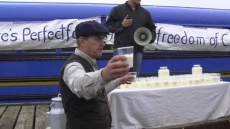OTTAWA - A confidential Red Cross investigation found numerous shortcomings at Canadian facilities for immigrant detainees including triple-bunked cells, lack of support for detained children and inadequate mental-health care.
In addition, because there are no dedicated immigration cells in many parts of the country, newcomers are often held in provincial jails or police facilities alongside suspected gang members and violent offenders, says the Canadian Red Cross Society's inspection report.
Through an agreement with the Canada Border Services Agency, the independent humanitarian organization monitors the treatment and conditions of people detained in Canada under the Immigration and Refugee Protection Act.
The border agency holds people who are considered a flight risk or a danger to the public, and those whose identities cannot be confirmed.
The Red Cross makes 28 recommendations to help close various "protection gaps" noted by inspectors during 63 visits to facilities in British Columbia, Alberta, Ontario, Quebec and Nova Scotia. In many cases the problems constituted a failure to comply with national or international standards.
The organization makes a confidential annual report to the border agency, which released the findings for 2012-13 under the Access to Information Act.
Agency spokesman Pierre Deveau said a number of steps have been taken to address the Red Cross's concerns.
However, he did not provide details and refused to make anyone available to discuss the report.
While the border agency operates holding facilities in three provinces, an estimated 3,952 immigration detainees were housed across Canada in 2012 in correctional institutions, commingled with criminal populations. (Data for the first quarter of 2013 was unavailable.)
The practice can be "extremely stressful" for some newcomers to Canada, the report says. "This is a particular concern for refugee claimants who have experienced armed conflict, torture, and other traumatic experiences."
In Alberta and Quebec correctional facilities, overcrowding was "a persistent concern," including triple-bunking — three people in a cell intended for one — and detainees sleeping on mattresses on the floor with limited personal space.
In general, the inspectors found border agency holding centres provided detainees a safer environment and better access to support services, legal advice, phone cards and visitors.
However, there were traces of mould and mildew at a border agency facility in Quebec as well as frequent overcrowding at the agency's British Columbia day facility for detainees with scheduled hearings, the Red Cross noted.
In 2012, an estimated 291 minors were detained under immigration law — 288 in federal facilities and three in provincial ones. However, it cautioned the numbers may actually be higher.
The Red Cross urged the border agency to implement a national policy governing minors in detention, citing their emotional and psychological needs. "This policy should specifically address minors who have additional vulnerabilities, such as those who are unaccompanied, those who may have been trafficked or those who require special physical and mental support."
Inspectors found the border agency had no facility that could appropriately accommodate a complete family unit of mother, father and children — or a father with child — without having to separate family members.
The report also noted uneven access to mental health services in immigration detention, calling the issue "one of great concern."
The B.C. coroner is investigating the death of Lucia Vega Jimenez, 42, who tried to kill herself while in border agency custody last December. She was taken to hospital and died days later.
The Red Cross recommends the border agency ensure alternatives to detention are available in all provinces.
The agency is studying various options including expanded use of telephone reporting and electronic ankle bracelets to keep track of people instead of locking them up.
The Canadian Council for Refugees has repeatedly raised many of the issues flagged by the Red Cross.
The usual response from the border services agency is that it cannot control conditions imposed by provincial authorities, council executive director Janet Dench said in an interview.
"The Red Cross however suggests that they could — and in fact have a legal responsibility to — ensure that those detained outside CBSA facilities have similar conditions, rights and support services as those in CBSA facilities."
The border agency takes its responsibility for the health, well-being and safety of detainees very seriously, Deveau said in an emailed statement.
"We strive to treat all people with the utmost respect and sensitivity in keeping with the agency’s core values."




